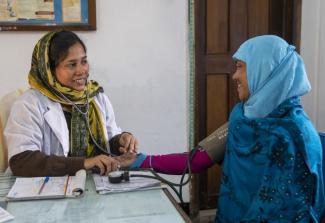Over the past five decades, Bangladesh has made tremendous progress in health. With support from USAID, maternal and child mortality has reduced by two-thirds, and the average number of children a woman gives birth to has decreased from more than six to two. Some 65 percent of all births currently take place in health facilities, compared to just 17 percent in 2011, and maternal mortality has also stagnated. Nonetheless, despite notable improvements in nutritional status, almost one-fourth of children remain stunted. Around 64 percent of married couples use contraceptives to delay or limit childbearing, but 10 percent of currently married women under age 50 say they would like to use contraceptives but do not have access to them. Additionally, Bangladesh is one of eight countries that account for more than two-thirds of the global tuberculosis (TB) burden, and this curable disease kills approximately 115 people across the country every day.
USAID health investments support the Government of Bangladesh’s (GOB) Health, Population and Nutrition Sector program and include a broad range of activities to improve the affordability, equity, and quality of services across the country in the public and private sectors. In addition, USAID aims to strengthen health systems to become more resilient and to respond to and recover from shocks. USAID works in maternal, neonatal, and child health; reproductive health; nutrition; TB; and the prevention and control of infectious disease outbreaks.
Strengthening Health Systems
USAID works with the GOB and the private sector to enable health systems to deliver high-quality, equitable services. This includes systems to manage human resources; continuously improve the quality of services; ensure health product availability; optimize resources utilization; as well as improve governance and accountability, and strengthen use of information for decision-making.
Building on Maternal and Child Health Progress
USAID partners with the GOB to expand access to quality services for mothers and children during the pregnancy, delivery and post-delivery periods to continue to reduce maternal and child mortality. USAID also stimulates demand for services by encouraging pregnant women to attend antenatal checkups and give birth under the supervision of a skilled health worker.
Combating TB and Other Infectious Diseases
USAID supports the GOB in its efforts to reduce the burden of TB, including improved diagnosis and treatment of multidrug-resistant TB. USAID also provides support to ensure an appropriately trained workforce and strengthened GOB capacity to effectively detect, monitor and respond to infectious disease threats and antimicrobial resistance.
Improving Nutrition
Child nutrition has steadily improved, with stunting rates dropping from 41 percent in 2011 to 24 percent in 2022. Still, only 35 percent of children consume the minimum acceptable diet and 44 percent of women of reproductive age are malnourished. USAID health programs improve community outreach, access to facility-based nutrition services, and market micronutrient supplements. USAID’s multi-sectoral approach to addressing the complex causes of malnutrition includes health, agriculture, climate change, and water, sanitation and hygiene programs.
Strengthening One Health Systems
USAID supports Bangladesh in its efforts to strengthen coordination between the Ministries of Fisheries and Livestock, Health and Family Welfare, and Environment, Forest and Climate Change to improve surveillance and mitigation capacity for zoonotic diseases, infections that are spread between people and animals. USAID also supports systems to ensure an appropriately trained workforce to improve biosafety and biosecurity in food production and reduce overuse of antibiotics to reduce antimicrobial resistance.
Results
- USAID supported Bangladesh in passing its first Drugs and Cosmetics Bill since 1940 to protect consumers from unsafe medicine. The new bill imposes fines for selling counterfeit or unregistered medicines and will help improve drug quality and safety for millions of consumers across Bangladesh, while opening up new opportunities to expand pharmaceutical exports.
- In 2023, USAID expanded partnerships with four established private TB screening and treatment centers, testing 22,636 people with rapid molecular testing machines to help identify over 3,500 active TB cases and contribute to successfully treat 97 percent of identified drug-sensitive TB patients, and 80 percent for drug-resistant TB patients.
- USAID helped launch the nation’s first medical devices testing laboratory in 2023, enabling Bangladesh to provide quality assurance of lifesaving medical devices and personal protective equipment and set the stage for the country to manufacture and certify its own medical equipment in the future.
- USAID delivered maternal nutrition counseling, infant feeding, and handwashing demonstrations to more than 400,000 pregnant mothers. In addition, USAID delivered iron-folate supplements to over 265,000 mothers, nutrition interventions to more than 196,000 under-five children, and Vitamin A supplements to over 371,000 children.
- USAID’s long-time partner, the Social Marketing Company, sold over 41 million sachets of micronutrient powder for children under the age of five, 90 percent of the oral-rehydration solution sold in Bangladesh, and 49 percent of the feminine hygiene products sold in Bangladesh.
Resources

